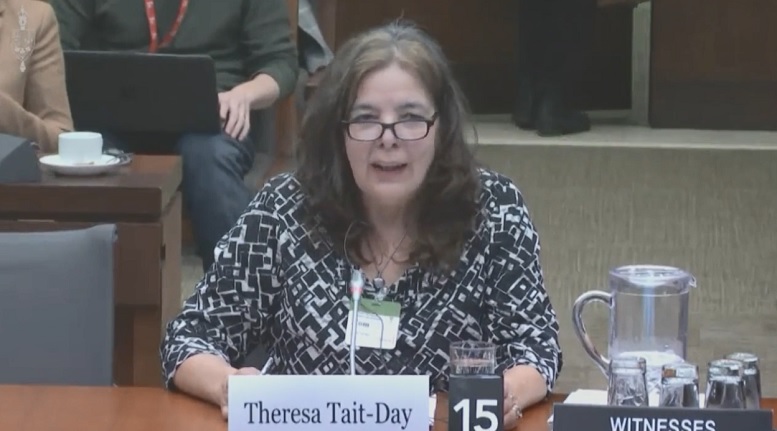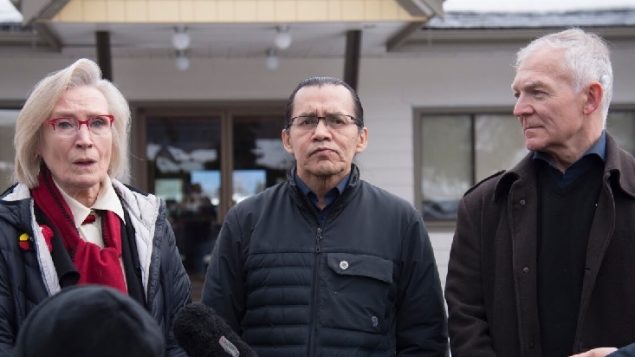The rail blockades may be down and the transportation network working to get back on schedule, but the dispute over the natural gas pipeline in northern British Columbia that started the crisis seems to continue.
The pipeline is to cross 20 indigenous controlled areas and over five years of discussions, all 20 elected band chief councils have come to an agreement with the company, Coastal GasLink. That group includes the Wet’suwet’en as represented by the democratically elected chiefs in the band council.

Purple indicates Wet’suwet’en claimed territory, Green indicates proposed pipeline route. (CBC)
However a small group of hereditary chiefs are opposed to the pipeline, a position which sparked weeks of solidarity protests, demonstrations and the rail blockades all across the country by other First Nations groups and environmentalist. Eventually the federal and B.C governments came to an agreement with the hereditary chiefs, a deal which calmed the protests and blockades. This was apparently over land rights and not specifically about the pipeline project although details have not been released. The hereditary chiefs say the elected band council chiefs are the creation of the federal Indian Act which was imposed upon all First Nations
Meanwhile, accusations continue to fly back and forth between opposing groups within the Wet’suwet’en about who speaks for that First Nations group.
Last month, Bonnie Georgie, a Wet’suwet’en member of the Witset First Nation said that those like herself who were in favour of the line, were being bullied, threatened and called traitors by the opponents. She added there was a lot of support for the pipeline within the community.
80% of Wet’suwet’en wanted the deal says T. Tait-Day
A third group comprised of women had been created in 2015 called the Wet’suwet’en Matrilineal Coalition (WMC) which promoted the line saying the band needed the money and jobs from Coastal GasLink.
One of the WMC founders, Theresa Tait-Day speaking before a Parliamentary committee said five hereditary chiefs had “hijacked” the project and she criticised the government for making a deal with them.
Quoted by PostMedia “The government has legitimized the meeting with the five hereditary chiefs and left out their entire community. We can not be dictated to by a group of five guys.” She added that 80 per cent of the band wanted the line to proceed. She also said the dispute was hijacked by the solidarity protesters “who have their own agenda”.

Wet’suwet’en hereditary sub-chief Theresa Tait-Day appearing as a witness before a Parliamentary committee, said the pipeline project had been hijacked by a small group of opponents within the band and by environmental protesters with their own agenda (Facebook APTN-CPAC)
Elected chief Maureen Luggi also expressed frustration saying the recent negotiations between the federal and provincial government and the hereditary groups excluded the elected chiefs.
Dan George is an elected chief of the Ts’il Kaz Koh First Nation in B.C which will also decide on the tentative rights and land titles deal between the government and Wet’suwet’en hereditary chiefs. Interviewed by the public broadcaster, CBC, he said he felt the hereditary chiefs were not representing the best interests of their people. He alsl felt it was wrong for the government to exclude the elected chiefs from the negotiations.
CBC Radio “As It Happens”interview host Carol Off with Chief Dan George
Whether the new land rights deal is accepted or not by all parties, the dispute over the pipeline itself apparently still remains unresolved.
Additional information-sources
- CBC: Feb 11/20: ‘People are afraid to speak up’: Wet’suwet’en member defends her support for pipeline
- PostMedia (via Daily Press) R. Tumilty: Mar 10/20: Pipeline project was ‘hijacked’ by ‘group of five guys,’ former Wet’suwet’en hereditary chief tells MPs
- CBC: Mar 9/20: Elected chiefs should have been at the table for Wet’suwet’en deal, says Chief Dan George
- Global: S. Little: Mar 4/20: Elected Wet’suwet’en chief feels shut out of discussion over tentative deal with B.C., feds
- Aboriginal Peoples Television Network: B. Forester: Mar 10/20: Wet’suwet’en sub-chief who supports Coastal GasLink says supporters, elected chiefs aren’t being heard
- CPAC: Primetime Politics: discussion on Parliamentary hearing and interview with T. Tait Day ( at 52:30 mark)
- Facebook APTN: Tait-Day testimony at Parliamentary Indigenous and Northern Affairs committee (at 1:33:30 mark)







For reasons beyond our control, and for an undetermined period of time, our comment section is now closed. However, our social networks remain open to your contributions.